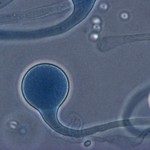Link to Pubmed [PMID] – 32819454
Link to DOI – 10.3201/eid2609.200276
Emerg Infect Dis 2020 09; 26(9):
Nine new human invasive infections caused by the keratinophilic fungi Nannizziopsis obscura have been reported in France since 2004. The patients had variable clinical manifestations, had frequent dissemination, were mainly T-cell immunocompromised, and all originated from sub-Saharan West Africa. Before collection of the isolates, the etiologies of these infections were often misidentified, underscoring the extent of microscopic and cultural polymorphisms. All isolates but 1 had low MICs for the 8 antifungal drugs tested. When treated, patients received mainly azole therapy. Two of 7 patients with a known outcome died. We performed multilocus sequence analysis of N. obscura clinical strains and several strains of Nannizziopsis spp. isolated from reptiles. The human strains were clearly differentiated from the animal strains. N. obscura might be endemic to West Africa and responsible for undetected infections, which might become reactivated when immunosuppression occurs. N. obscura infection is probably underestimated because only sequencing enables proper identification.



